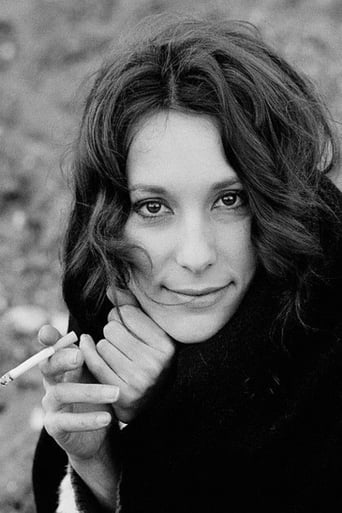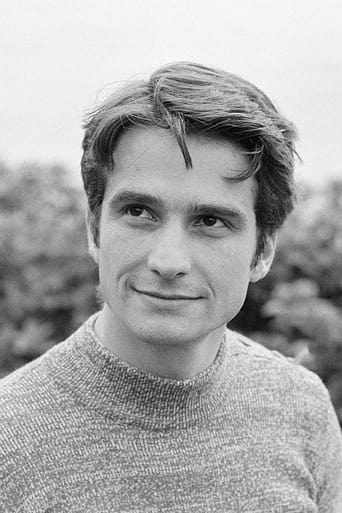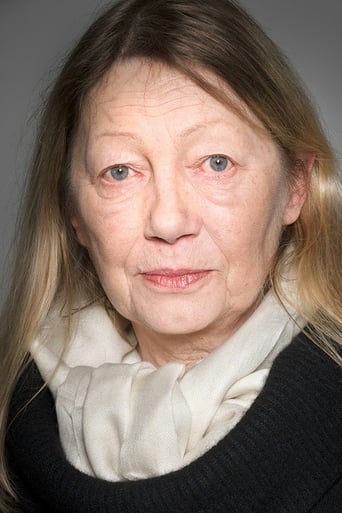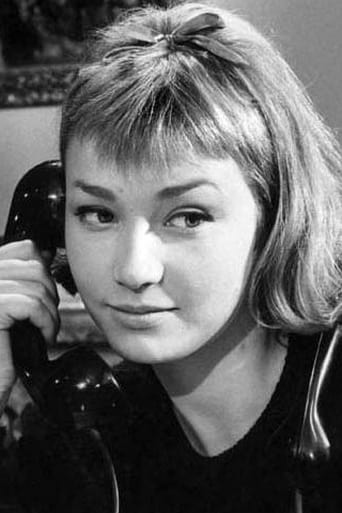GamerTab
That was an excellent one.
Kidskycom
It's funny watching the elements come together in this complicated scam. On one hand, the set-up isn't quite as complex as it seems, but there's an easy sense of fun in every exchange.
Neive Bellamy
Excellent and certainly provocative... If nothing else, the film is a real conversation starter.
Ava-Grace Willis
Story: It's very simple but honestly that is fine.
Jackson Booth-Millard
I found this French film listed in the book 1001 Movies You Movies You Must See Before You Die, I remembered both because of the memorable title, and the fact that it was one of the longest films, at three and half hours long, I was hoping it would be worthwhile. Basically in Paris, unemployed young man Alexandre (Jean-Pierre Léaud), who has memories of the civil unrest during May 1968. He is trying to persuade his former love Gilberte (Isabelle Weingarten) to marry him, Gilberte instead chooses to marry another man, Alexandre meanwhile is involved with a live-in girlfriend called Marie (Bernadette Lafont). At the highly popular Les Deux Magots one day, Alexandre tries an unsuccessful attempt to reconcile with Gilberte, there he meets Polish French twenty-something nurse Veronika (Françoise Lebrun), she is highly promiscuous and makes advances towards him. During the summer of 1972, Alexandre and Marie are naked in bed together in their apartment, when Veronika visits, Marie lets her in, Veronika insults both of them, but acknowledges she is not pure herself. The three begin a ménage à trois (household of three), a domestic arrangement for the three of them to have a sexual relationship with each other and sleep in the same bed. Veronika assures Alexandre she and Marie both love him and tell him to be happier with his situation and life. Although Marie maintains her indifference to Alexandre's affairs, she quickly changes her mind when she sees how close he getting to Veronika, Marie and Alexandre grow estranged. The three of them sit together, Veronika tries to reassure Marie about her looks and body, she tearfully speaks about her belief that no women are truly whores, and that love is meaningless unless a child is produced. Also starring Jacques Renard as Alexandre's Friend. Léaud gives a good performance as the womanising lothario, it is a pretty simple story of a man who can manipulate two women into loving him, one a good nurturing woman, the other a woman who turns to prostitution, it is very long, but there are some fairly memorable scenes, and it does represent the sexual revolution of the time well, all together it is a worthwhile drama. Very good!
Blueghost
... is because of films like this.Don't get me wrong. I like independent cinema, and particularly like good foreign films, but this film could have been cut by at least an hour.I'll explain.The film revolves around a self centered young man who professes he loves certain women, but is really looking for someone to love him. Enter a woman who doesn't love herself, but finds this same young man, taps his energy, and both wind up "flowering" for it.This movie revolves around the sexual morays and politics of a small group of Parisians. The film starts out very strong. Actors present characters in an extended first act that we would like to get to know, but, unfortunately this pic becomes the poster boy for the proverbial "long boring French film" replete with characters who light up cigarettes and talk in either cafés or materially spartan rented rooms about how life should be different, and what it all means. Toss in an Oedipal complex/undercurrent, and you have the quintessential French avante-garde flick.Huh.Inspite of this there's some good material in this film, but director Jean Eustache (probably to make up for lack of scheduling and some technical aspects) throws a lot of dialog at the audience that would've have been better served with some visual cues.All in all it shows how messed up an certain sect of French culture really is, and, perhaps ironically, drives home a realist message regarding the act of coupling.Technically it's bare bones. Lots of natural lighting is fused with high contrast B&W cinematography, and to add to the rugged feel of the film the scratch track is used. Little to no looping of dialog. You can hear what pros call "room tone" as it was actually recorded during filming.I could go off the deep end and call this film self-indulgent, pretentious et al, but will say instead that the exposition given to the story was "over-exposed" (for lack of a better term). The symbolism is fine, but a lack of visuals and a borderline in-you-face delivery of certain dialog, hampers what could have been a much better film. By that I don't mean commercially successful nor accessible, but a film that could have delivered the same gists, character and message without the flaunting its strive for artistic excellence.
moimoichan6
"La Maman et la putain" is the beautifulest film of all time. And what's most moving about it may be the relation between reality and art the movie deals with, which is directly inspired by Proust's "A la Recherche du temps perdu".Indeed, "La Maman et la putain" and "In search of lost time" apparently tell the same story : the one of the failure of love, which repeats itself endlessly. The first woman's name is always Gilberte, and the second woman appears like a twisted and deformed double of Gilberte : Veronika is like a "whore Gilberte", beautiful like the night, whereas Gilberte was pure, and "beautiful like the day". After the failure of the first love, a second love begins, but this one is like already doomed by the first one. Veronika takes the place of Gilberte, in Alexandre's life and in the movie. She progressively eclipses her, first by time to time, Gilberte's still coming when Alexandre waits for Veronika,then totally. That shows it's the same sad story repeating itself, the same "unfaithful woman", like Alexandre says, who appears endlessly - and unfaithful is for Proust the higher point in love, which makes it exist, but which also underlines its illusions.Art is what causes the passage between what's outside - the illusion of love - to what's inside, which is the truth, and is a learning of this truth. For instance, when Veronika notices the strange way Alexandre makes is bed, he answers that he saw it in a movie, and then, that a movie, "it's made for that, to learn how to live, how to make a bed". Alexander wants to live like he was in a film, he wants his life to be art. This conception of art comes from Proust, with whom Eustache shares the same rejection of "political art" and realism in art. "La Maman et la putain" fights against a conception of art "principaly political" - see for example the ironical review of a political movie by Alexandre. Like Proust says : "Art doesn't care for all this proclamations, and only exists in silence." First of all, art is introspection. And that also why realism or naturalism is rejected : art needs to transform reality to exist. Proust writes : "I discover the illusion of realism, which is a lie". That's why "La Maman et la putain" doesn't hide its artificiality, underlines by the way the actors "say" their text : "the more you seem artificial, the higher you go", said Eustache.Eustache and Proust both share this idea that the artist is a "translater" of a inner truth. But, Alexandre failed where Eustache succeed. "La Maman et la putain" tells us the failure of a character to be what he truly is. You can sens the tragedy arise when you go further in the movie, which becomes saddest. You can see it in the face of Alexandre, who looks more and more like a living-dead. You can see it by the fact that the scenes become longer, and that after a while, nothing happens outside. At the end of the movie, when you see Alexandre writing, and Veronika asking if he's writing his life,you can guess that he's not, that even literature failed. The end of the movie shows the symbolic death of Alexander, who is smashes by the heaviness of reality. And in this tiny nurse's room, Alexandre looks more like Albertine than Marcel.To explain this failure, we can say that Alexandre is a Balzac's reader. In "Forme et signification", Jean Rousset explains that, in Proust's, the readers of Balzac, who are Swann and Charlus, are unable of any artistic creation, because they're stuck in reality, which they mistake with art. They see reality in art and "are not aware of the transformations that necessarily exist between the life of an artist and his work, between reality and art". And that's exactly Alexandre. He claims for instance that he "loves a woman for parallel reasons, because she played in a Bresson's for example". He's like Swann, who falls in love with Odette because she looks like a Botticelli's woman."Life is perhaps not my vocation". This thought is indeed by Eustache, who committed suicide, even if it's said by Alexandre. Nevertheless, there is a difference between Alexandre and Eustache : if Eustache is absolutely Alexandre, Alexandre is like a double without art, a horrible vision of the artist, which crystallizes his fears.By fallowing Veronika at the end of the movie, Alexandre is condemned to illusions. It's death that remind me the last frames of the movie, in the face of Jean-Pierre Léaud as well as in the endless pucking of Veronika. Or maybe it is already hell that describes the end, like in Sarte's "Huit-Clot", and absolutely not like in the final liberation of "Le Temps retrouvé". If Eustache had read Proust, Alexandre could never have finish the book , always perturbed by life and Veronika when he tries to read it at his apartment or in the cafés. "La Maman et la Putain" is like a inverse double of "In search of lost times", which tells how Alexander doesn't become an artist, whereas "A la Recherche du temps perdu" tells how Marcel becomes a writer (Genette).If, like Baudelaire says, an artiste tells "reality at the light of his dream", it is his nightmare that Eustache tells us in "La Maman et la putain".
patoprods
If you enjoy French cinema then you are used to heavy dialogue and little action. Some ARE sleep-inducing, so the key is...BE AWAKE! Don't watch something like this on a small screen and without some degree of mental awakeness. I had the privilege of seeing this film within a festival and found it to be terrifically witty, sexy at points, and thought-provoking. I was engaged for nearly the entire length of the film, with the exception of a really protracted scene among the three principals towards the end. Anyway, boring is too easily said of long movies watched on videocassette. If you have some way of seeing it bigger, that's the way to catch it. And of all of Eustache's works the one I recommend most is Mes Petites Amoureuses ("My Little Loves") set in the world of children. Just amazing. Maybe someday it will be available for rent. It's very accessible and is as effective as Truffaut's Small Change.






